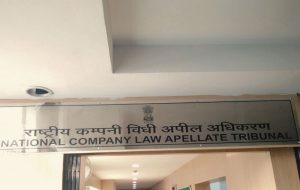National Company Law Appellate Tribunal (NCLAT): A Division Bench of Justice Venugopal M. (Judicial Member) and V.P. Singh (Technical Member) dismissed an appeal filed against the order of the National Company Law Tribunal, Hyderabad (“NCLT”), whereby the NCLT had admitted an application filed by the Financial Creditor−Punjab National Bank under Section 7 of the Insolvency and Bankruptcy Code, 2016 (“IBC”) for initiation the Corporate Insolvency Resolution Process (“CIRP”) against the Corporate Debtor−Saptarishi Hotels (P) Ltd. The appellant was the promoter/suspended director of Saptrishi Hotels (P) Ltd.
The Corporate Debtor is a ”special purpose vehicle” incorporated to undertake a certain public-private partnership project with Government of Telangana. The Corporate Debtor availed of a loan facility from a ‘consortium’ which included Punjab National Bank (“PNB”). Having defaulted in repaying the loan amount within time, PNB filed a Section 7 IBC application which was admitted by the NCLT.
Corporate Debtor’s Argument
The Corporate Debtor raised the issue of limitation. It was contended that the NCLT erred in admitting the application since it was barred by limitation. The Corporate Debtor took a stand that the ‘date of default’ for all facilities extended by PNB was 30-3-2016, whereas the Section 7 application was filed by PNB only on or after 18-7-2019. According to the Corporate Debtor, the period of limitation (3 years) for filing the Section 7 application expired on 29-6-2019. Therefore, PNB’s application, having been filed beyond the 3 years’ period of limitation, was liable to be rejected.
Financial Creditor’s Argument
The Punjab National Bank refuted Corporate Debtor’s argument by stating that the Corporate Debtor has not filed two a vital documents, viz. ‘Balance and Security Confirmation Letter’ dated 20-2-2018 executed by the Corporate Debtor, which amount to an ‘acknowledgment of debt’ as contemplated under Sections 18 and 19 of the Limitation Act, 1963.
Discussion
Insolvency and Bankruptcy Code, 2016
For deciding the appeal, the Appellate Tribunal referred to certain provisions of IBC, including:
(i) Section 3(6)(a), which defines “claim” meaning a right to payment, whether or not such right is reduced to judgment, fixed, disputed, undisputed, legal, equitable, secured or unsecured.
(ii) Section 3(8), which defines “Corporate Debtor” meaning a Corporate person who owes a debt to any person.
(iii) Section 3(10), which defines “Creditor” meaning any person to whom a debt is owed and includes a financial creditor, an operational creditor, a secured creditor, an unsecured creditor and a decree-holder.
(iv) Section 3(11), which defines “debt” meaning ‘a liability or obligation in respect of a claim which is due from any person and includes a financial debt and operational debt.
(v) Section 3(12), which defines “default” meaning non-payment of debt when whole or any part or installment of the amount of debt has become due and payable and is not paid by the debtor or the corporate debtor, as the case may be.
Acknowledgment − Limitation Act, 1963
The Appellate Tribunal noted that Section 18 (Effect of acknowledgment in writing) of the Limitation Act does not enjoin that an ‘acknowledgement’ has to be in any particular form or to be express. The Appellate Tribunal further said that it must be borne in mind that an ‘acknowledgement’ is to be examined resting upon the attendant circumstances by an admission that the writer owes a ‘debt’. No wonder, an ‘unconditional acknowledgement’ implies a promise to pay because that is the natural inference if there is no other contrary material.
“Further, to treat the writing signed by an individual as an ‘acknowledgement’, the person acknowledging must be conscious of his liability and the commitment ought to be made in respect of that liability.“
Decision
After a careful consideration of respective contentions projected on either side, the Appellate Tribunal held that considering the prime fact that the ‘guarantors’ in respect of the Corporate Debtor had executed a Balance and Security Confirmation Letter (confirming the correctness of debit balance) and keeping in mind yet another fact that a certain part payment was made by the Corporate Debtor on 15-10-2018 towards its liability to Punjab National Bank, the irresistible conclusion was that there was an acknowledgment of debt as per Sections 18 and 19 of the Limitation Act in respect of the loan account of the Corporate Debtor.
Therefore, the Appellate Tribunal dismissed the appeal filed by the Corporate Debtor holding that the NCLT rightly admitted the Section 7 application filed by the Financial Creditor. [Lakshmi Narayan Sharma v. Punjab National Bank, 2021 SCC OnLine NCLAT 155, decided on 12-5-2021]

